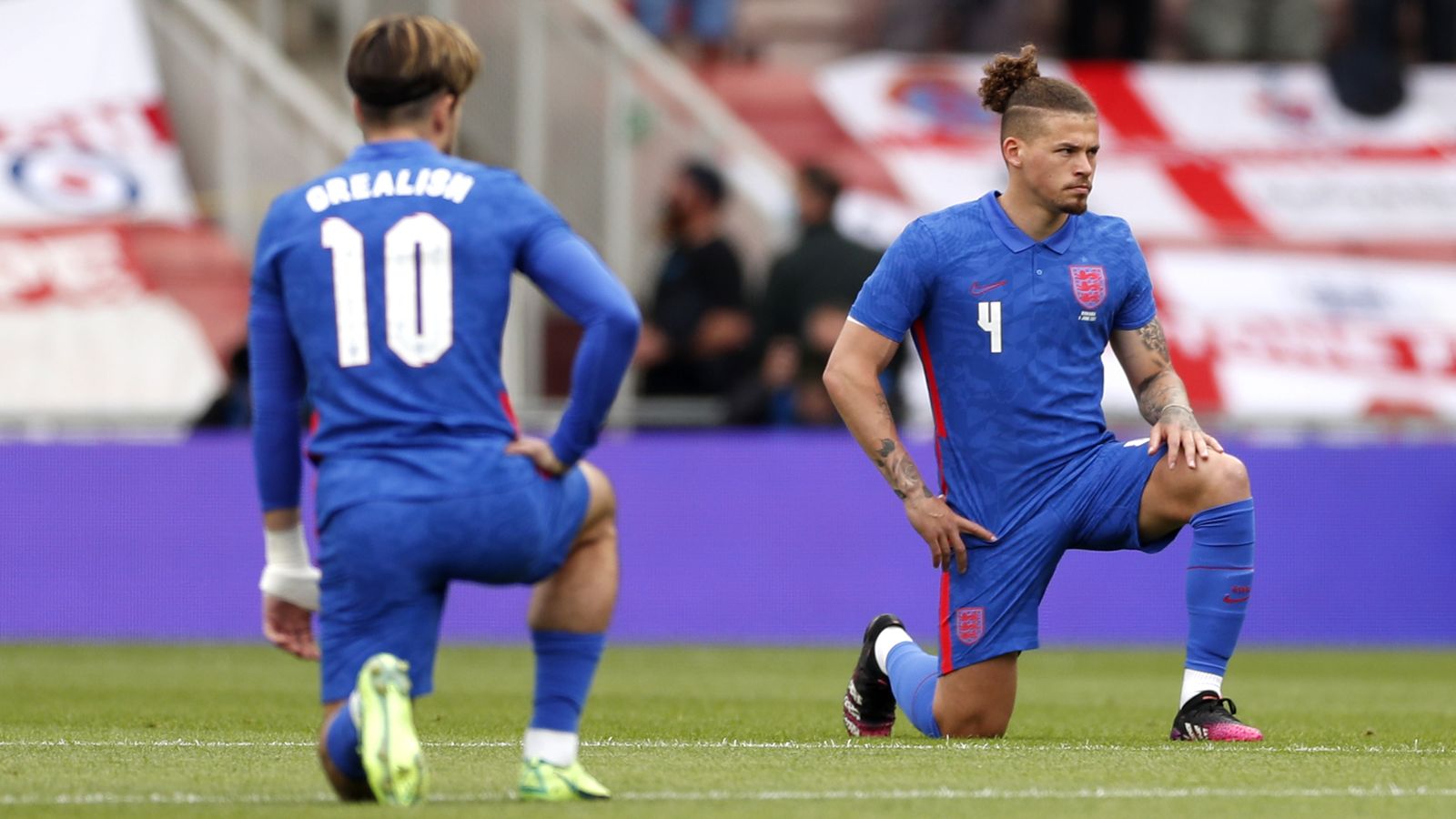More football fans in Europe – including those in England, Scotland and Wales – are supportive of players taking a knee than are against it, but they are split over the gesture’s importance in tackling racism, according to a major survey.
Polling company YouGov has shared with Sky Sports News the results of a study of 4,500 football fans carried out across nine countries in March this year, during the football season.
Most nations and groups had more fans who supported players taking a knee, with opposition mostly coming from a vocal minority.
Fans were asked: In some countries, professional football players and staff have chosen to kneel at the beginning of each game to show their support of the Black Lives Matter movement. Would you support or oppose professional players and staff in your country kneeling before each game in this fashion?
In England, from a survey of 547 football fans, 54% said they back players and staff taking a knee to support the Black Lives Matter movement. Half of those people (27%) said they strongly support it, with the other half somewhat supporting it.
Some 39% of football fans in England said they opposed players taking a knee while 7% said they did not know. In the last fortnight, England players faced boos from some of their own fans attending their final two Euro 2020 warm-up games at Middlesbrough’s Riverside Stadium.
England manager Gareth Southgate has said his squad are determined “more than ever” to take a knee during Euro 2020.
In Scotland, 49% said they supported players taking a knee, with 42% against from a survey of 352 football fans completed at the end of February. In Wales, from a sample of 308 football fans, 53% said they were supportive of the gesture with 37% opposing it.
YouGov also spoke to a sample of almost 200 football supporters from ethnically diverse backgrounds across Great Britain. Among those fans, 78% said they supported it, 12% did not, with 10% saying they did not know.
There were also high levels of support among fans in some European countries. Portugal had the highest, with 79%, followed by Italy (73%) and Spain (71%). Only the Netherlands had less support and more opposition with 44% in favour and 45% not supporting the move.
Players, officials and staff across the leagues took a knee prior to kick-off at matches when football resumed last summer after a break because of the coronavirus pandemic, but some clubs chose to stop during the season.
The gesture was seen around the world during protests following the murder of George Floyd and the subsequent rise of the Black Lives Matter movement.
The Black Lives Matter slogan was present on Premier League players’ shirts during the restarted 2019-20 season and was later changed to a patch with the words No Room For Racism – the Premier League’s own anti-racism initiative.
How important is the gesture in tackling racism?
When asked specifically about kneeling, only 37% of football fans in England thought the gesture was important in tackling racism. From this sample, just over a quarter thought it was very important with the remainder viewing it as somewhat important.
However, 57% of football fans in England did not think it was important when it comes to tackling racism, with just over a third (34%) thinking it is not important at all.
In Scotland, 36% of fans thought it was important, while 57% did not – the same percentage as fans in England. In Wales, views were a little more evenly split with 41% deeming it important, and 53% thinking it was not.
The results were different when looking at football fans from ethnically diverse backgrounds in Great Britain. Some 61% felt it was important. However, almost a third (32%) did not think it was important in tackling racism.
A larger percentage of fans in the European countries felt taking a knee was important in tackling racism. The highest figure came in Portugal, with 76%. It was 66% in Spain, while 54% of fans in Italy shared the same view.
In Germany and France, 48% of football fans thought it was important – a higher proportion than in the home nations.
The number disagreeing in Germany was 42%, and 43% in France.
Why do players take a knee?
Football fans across Europe tend to be familiar with the sentiment behind taking a knee, but nowhere more so than the home nations. This also included 88% of football fans in Britain from an ethnically diverse background.
Among individual countries, 92% of fans in Wales said they were familiar with the reasons behind taking a knee – more than any other European country. This is followed by 90% in England and 88% of supporters in Scotland.
Among continental European fans surveyed, those in France (69%), the Netherlands (69%), and Spain (69%) are the most likely to be familiar with why the gesture is used.
Taking a knee became widely known in sport when NFL quarterback Colin Kaepernick used it during the national anthem in 2016 to protest against police brutality and racial inequality.
It became widely adopted in sport, and politicians, protesters and police have taken a knee across the world to show their commitment to tackle racial inequality.
Aston Villa and England defender Tyrone Mings believes taking a knee, particularly in England’s Premier League, has been central to keeping wider conversations about racism on the agenda.
“The Premier League is supporting it and that allows other doors and other conversations to be open and to be a little more free-flowing,” Mings said last month.
“I think if we had taken a knee for one game last year and then stopped, I’m not sure we would have seen anywhere near the amount of conversations we’ve seen around online abuse, around racism, and around discrimination in any form in the last 12 months.
“I think it would be another ‘wear a T-shirt for a weekend’ and then wait for that same day the following year. I don’t think it would have gained any momentum if we hadn’t continued to take the knee.
“I think [sometimes] the people who are frustrated by it see it as just a gesture we do before a game and perhaps don’t grasp how influential we can be with the actions that we take.”
Newly-promoted Brentford stopped taking a knee last season because they believed the gesture was “no longer having an impact”.
Championship side QPR’s director of football, Les Ferdinand, said the message behind the gesture had been lost when he defended his team’s decision to stop kneeling in September.
Virtually all Premier League players took a knee last season, with Crystal Palace forward Wilfried Zaha becoming a notable exception when he became the first player to refrain from the gesture and stand. It happened before kick-off in Palace’s 1-0 win over West Brom in March. Zaha stood for the rest of the season while all other players in England’s top division continued to kneel.
Speaking in February, Zaha said kneeling was “degrading” and he encouraged players to “stand tall” in defiance of racism. After deciding to stand the following month, Zaha released a statement.
It read: “There is no right or wrong decision, but for me personally I feel kneeling has just become a part of the pre-match routine and at the moment it doesn’t matter whether we kneel or stand, some of us still continue to receive abuse.
“I also fully respect my teammates and players at other clubs who continue to take the knee.”
You can read the full results of the survey on YouGov’s website.
Online Reporting Form | Kick It Out
Kick It Out is football’s equality and inclusion organisation – working throughout the football, educational and community sectors to challenge discrimination, encourage inclusive practices and campaign for positive change.






















